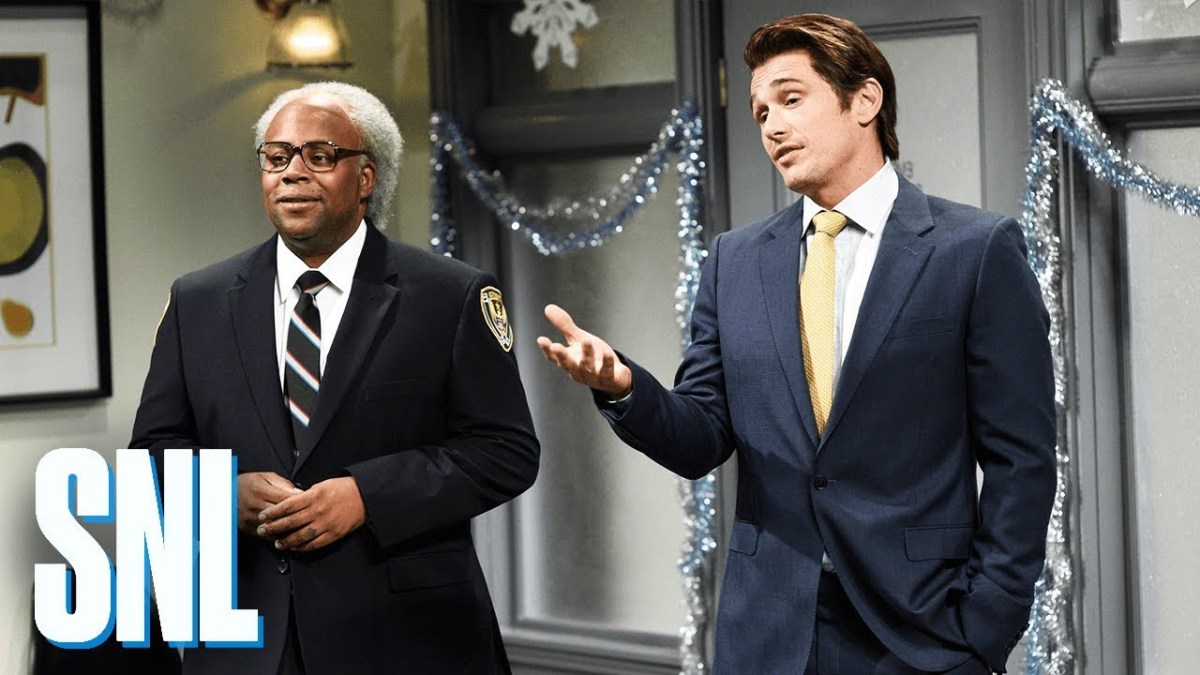On last night’s episode of Saturday Night Live (SNL), host James Franco and the cast frequently took on the sexual harassment scandals that continue to rock politics, media, and technology. From a cold open where Santa realized how many politicians belong on the Naughty List, to Weekend Update joking about a “sexual harassment Advent calendar,” the episode didn’t shy away from addressing how prevalent this problem is.
However, the “Sexual Harassment Charlie” skit eschewed the “mock predators” approach of most other jokes and went straight for super-reactionary.
In the skit, Franco plays a CFO, Doug Gifford, who’s being fired for sexual harassment, and Kenan Thompson plays Charlie, a “front desk guy” who’s also being fired for sexual harassment. The two come into the room to formally apologize to the female employees, and it quickly becomes clear that Gifford has been fired for remarks like calling women “my little honeybee” and telling them to “smile more,” while Charlie is far more explicit and inappropriate.
Now, I recognize that there’s a point underlying this. Our society does push different expectations on different types of men, and many of the excuses made for harassers include things like, “Oh, that’s just how he is” or “He doesn’t mean any harm” or “He’s from a different generation.” Some men don’t get coded as threatening, and as we’ve seen with cases like Louis C.K. and Bill Cosby, those men can then use that coding to mask their predatory behavior. I’ve also written before about the ways that our current discussion around sexual harassment leaves out working-class women and the harassment they face from their colleagues and customers. All of these are legitimate points to bring up in a sketch.
However, the optics and writing of this sketch are just … no. First and foremost, it seems to suggest that white male executives are somehow the most likely to face consequences for their actions, a perspective you could only seriously adopt if you’ve been paying attention to sexual harassment for maybe five minutes. Our current reckoning with sexual harassment has started at the top, with high-profile men like Harvey Weinstein and Kevin Spacey; that much is true.
But these men are also the starting points because they are serial harassers. And you don’t get to attack that many victims, over that many decades, if the system is somehow unfairly stacked against you. You commit that many crimes because you are enabled by your power and your privilege.
Franco also plays his character like he’s genuinely perplexed or confused about the way his comments were interpreted, but having been sexually harassed myself, I feel pretty comfortable saying that men always know it’s creepy. They just think it’s a level of creepy you should have to put up with. In addition, there’s no suggestion that his character “Doug” had any negative effect on these women’s careers. However, misogynist harassers don’t just make a passing comment and let you get on with your life. They’re misogynists. They block the advancement of women who don’t play nice, they promote and respect their male colleagues far more than they do their female colleagues, and they retaliate against anyone who reports them or chastises them. There’s no acknowledgement in this skit that, perhaps, powerful men’s transgressions are more strongly condemned than those of the front desk guy because they have a far more tangible affect on women’s livelihoods.
I am much more concerned with Trump than I am with my friend’s Fox-News-loving uncle, but that’s not because I don’t have a problem with the Fox-News-loving uncle. It’s because Trump has a lot more power to hurt people with his attitudes than my friend’s uncle.
The race optics of this sketch are also … just, wow. The United States has a horrifying, racist history of painting black men as sexual predators (particularly when it comes to white women), a history that still spawns racist memes to this day. And so the fact that they had Kenan Thompson play Charlie, alongside Franco’s very white Doug, was deeply troubling.
(And, yes, devil’s advocates: some men like Clarence Thomas and Bill Cosby have disingenuously used this history to try and discredit the women who accused them, and that behavior is reprehensible. But SNL isn’t grappling with the nuances of allegations against incredibly powerful, conservative black men in this sketch. They’re talking about a front desk guy.)
Again, I understand that they likely wrote this sketch to make a valid point about double standards, but the one they ended up making is that poor powerful white men are suffering under the tyranny of overly sensitive women who say they hate being harassed at work, but secretly love and are amused by harassment as long as it comes from the right dude.
Which we are not.
As Teresa wrote last month, there is a weirdly prevalent idea that certain dudes “get a pass” where sexual harassment is concerned. In resurrecting this idea, SNL didn’t add anything interesting or incisive to the national conversation about sexual harassment and assault. Instead, they revived reactionary ideas which put the blame back on women, and turn the sympathy back toward white men. Execution is everything, and I just thought this one did a terrible job.
As you can probably tell from this 900-word piece, I really didn’t like this skit, but I’m curious to hear all of your reactions.
(Featured image via screengrab)
Want more stories like this? Become a subscriber and support the site!
—The Mary Sue has a strict comment policy that forbids, but is not limited to, personal insults toward anyone, hate speech, and trolling.—









Published: Dec 10, 2017 12:30 pm